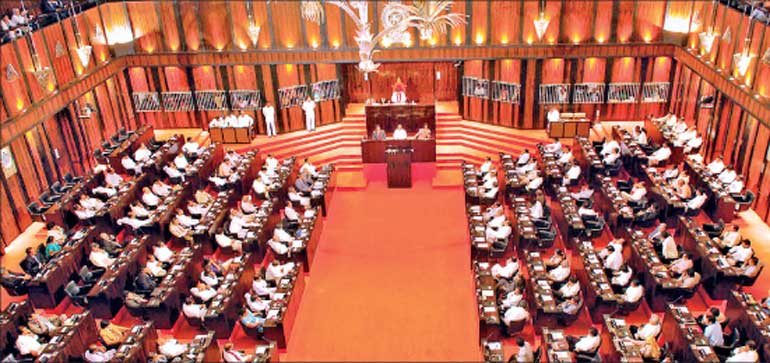Sunday Feb 22, 2026
Sunday Feb 22, 2026
Saturday, 15 July 2023 00:05 - - {{hitsCtrl.values.hits}}
 What is happening in Parliament is a clear case of institutions shaping the actors within
What is happening in Parliament is a clear case of institutions shaping the actors within
I am not advocating a one-party system for Sri Lanka. We simply don’t have the historical context for such. But I would argue against this notion that we cannot have democracy outside of the Westminster model of parliamentarism with a prime minister as the head of government who can be removed by a simple majority vote in Parliament. An evolving presidential system with increasing levels of accountability could be a more viable solution
 A year ago, our Parliament was under tremendous pressure. Gota-Go-Home protests that started in March of 2023 were accompanied by the demand that all 225 members of Parliament too should go home. The anger of the protestors was justified. As President Gotabaya Rajapaksa continued with reckless monetary policies, tax cuts, an organic farming pursuit at the expense of food security, and other ventures, the Parliament went along forgetting its oversight functions. But with the storming of the President’s house by protestors on 9 July that led to fleeing of the President and the mayhem that followed leaving one MP dead and homes of many MPs burned, a reality check set in. A new government with a new president, new PM, and a new Cabinet but the same old parliament was in place by the end of July.
A year ago, our Parliament was under tremendous pressure. Gota-Go-Home protests that started in March of 2023 were accompanied by the demand that all 225 members of Parliament too should go home. The anger of the protestors was justified. As President Gotabaya Rajapaksa continued with reckless monetary policies, tax cuts, an organic farming pursuit at the expense of food security, and other ventures, the Parliament went along forgetting its oversight functions. But with the storming of the President’s house by protestors on 9 July that led to fleeing of the President and the mayhem that followed leaving one MP dead and homes of many MPs burned, a reality check set in. A new government with a new president, new PM, and a new Cabinet but the same old parliament was in place by the end of July.
Yet, calls for new elections were relentless. The opposition rejected calls for an all-party government to ride the economic crisis and kept on demanding elections saying that the parliament too is rejected by the people. Out of self-interest or not, others stood for stability and incremental changes within the existing power structure.
The latter reality prevailed, and the Parliament is back on track with some of its powers over the executive restored. What is happening in Parliament is a clear case of institutions shaping the actors within. The 225 MPs who could not show their face in public are going about day-to-day business of parliament and making some progress. Things could be better, and a new set of faces is needed, but it is good to see reforms taking place with intense debate about the merits of each reform.
Re-establishment of the Constitutional Council is a huge step in reasserting the power and prestige of the parliament. The Constitutional Council (CC) of Sri Lankan Parliament is a first such among Parliaments of the world, I believe. It was first established by the 17th Amendment to the Constitution, abolished by the 18th, reinstated by the 19th, downgraded to an advisory body by the 20th, and finally reinstated by the recent 21st Amendment. In its present version, the CC consists of 10 members – the Prime Minister, Speaker, the Leader of the Opposition, an MP nominated by the President, three members representing the government, the main opposition party and other parties in the Parliament, respectively, and three civil society members of integrity and repute. The CC was slow to get started but it has now completed naming members for most of the independent commissions, one of its main functions.
The committee system in Parliament too is progressing and the Parliament’s FB page gives coverage if you care to follow. Challenges are there. In addition to 17 sectoral committees, there are 30 ministerial consultative committees and other standing committees and a whole host of select committees and caucuses amounting to more than 70 such bodies in Parliament. Some rationalisation may be needed. I had a chance to participate as a specialist for two different committees dealing with education and it was heartening to see MPs engaging with the issues, listening to specialists and bureaucrats, and giving practical solutions. Not all committees are alike. For example, as some pointed out, the recommendation of the sectoral committee on defence that privatising SLT would affect national security had no evidence behind it.
The present Parliament will complete its term in August of 2025. Since February of 2023 the President holds the power to dissolve the Parliament. While politics get played out and determine whether the present set of 225 gets to complete their term, I think it is an opportunity to be happy about the progress being made by the Parliament as an institution, no matter who occupies the place.
Parliamentarism in a new light
The 30th of June each year is designated as the day of international parliamentarism. This UN declaration commemorates the forming of the International Parliamentary Union on this date in 1889. Almost all 193 countries in the UN system have some form of parliament, and 179 of them are presently listed as members of IPU.
IPU does not make a distinction between one-party democracies or multi-party democracies. In Asia, Brunei, China, Laos, North Korea and Vietnam are countries which are labelled as non-democratic by political scientists. For example, in his book comparing electoral systems in Asia, Shugart takes these countries out of contention as not being democratic states, though they have their versions of Parliaments.
Another way parliaments across the world differ is the power of the parliament over the executive. As a Wiki entry by McGill University elaborates, in a parliamentary democracy, the executive branch of government is dependent on the direct or indirect support of the parliament, often expressed through a vote of confidence.” Typically, a vote of no-confidence requires only a simple majority.
But if you take the 179 parliaments listed in IPU, the power of the Parliament over the executive and multi-party nature of the parliaments varies quite a bit. China presents an interesting example which questions Western norms of parliamentary democracy.
Parliamentarism in China
In “China: Democracy that works”, a publication by the Chinese government goes to great lengths to argue that although China is a one-party state, the Communist Party of China (CPC) is a democratic Party and parliament should be judged on its own merit not a Western model of democracy.
“The CPC upholds democracy within the Party and practices democratic elections, decision-making, management, and oversight, to better serve the development of people’s democracy. The CPC has improved its mechanism for selecting and appointing officials, enabling outstanding individuals in all sectors to enter the Party leadership teams and the government, and ensuring that the leadership of the Party and the state rests in the hands of those loyal to Marxism, the Party, and the people.”
We should ask ourselves whether countries like Sri Lanka, which prides themselves on periodic elections open to any number of parties, can speak about their political parties in the above manner.
More interestingly, CPC identifies with values of Rule of Law, Integrity, Inclusiveness and Meritocracy, values which are associated with the Singapore miracle.
“The best way to evaluate whether a country’s political system is democratic and efficient is to observe whether the succession of its leaders is orderly and in line with the law, whether all the people can manage state and social affairs and economic and cultural undertakings in conformity with legal provisions, whether the public can express their requirements without hindrance, whether all sectors can efficiently participate in the country’s political affairs, whether national decision-making can be conducted in a rational and democratic way, whether people of high calibre in all fields can be part of the national leadership and administrative systems through fair competition, whether the governing party is in charge of state affairs in accordance with the Constitution and the law, and whether the exercise of power can be kept under effective restraint and supervision.”
Inclusiveness is something which is debatable about China where treatment of different ethnic groups is often critiqued. Whether the public can express their requirement without hindrance in the spirit of liberty as defined in Western democracies is another matter. Nevertheless, countries like Sri Lanka cannot hold a light to China and Vietnam for putting their countries on a growth path and lifting their people out of poverty with whatever political system.
Parliamentarism in the Sri Lankan context
I am not advocating a one-party system for Sri Lanka. We simply don’t have the historical context for such. But I would argue against this notion that we cannot have democracy outside of the Westminster model of parliamentarism with a prime minister as the head of government who can be removed by a simple majority vote in Parliament. An evolving presidential system with increasing levels of accountability could be a more viable solution.
Anyway, there are 179+ parliaments in the world with a variety of parliamentary models and a variety of electoral systems for electing those. But are those the most important issues about governance? For example, are we labouring excessively over the nature of the state and electoral system needed, without focusing on the fundamentals of internal democracy in our political parties, and whether we value integrity, meritocracy, and inclusiveness as a society?